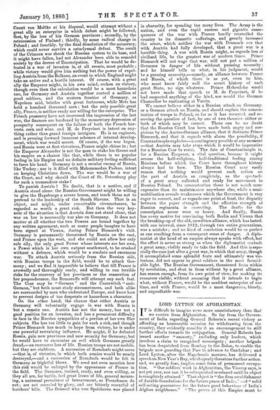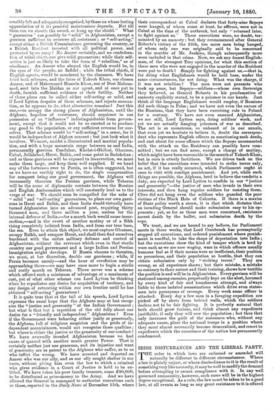LORD LYTTON ON AFGHANISTAN.
JT is difficult to imagine news more unsatisfactory than that we receive from Afghanistan. So far from the Govern- ment of India regarding General Roberts's recent victory as affording an honourable occasion for withdrawing from the country, they evidently consider it an encouragement to still further efforts towards its subjugation. General Roberts has issued another "amnesty," excluding only leaders, which involves a claim to recognised sovereignty ; another brigade has been despatched from Bombay to the Bolan, to enable the brigade now guarding that Pass to advance to Candahar ; and Lord Lytton, after the Napoleonic manner, has delivered a speech on New Year's Day, which openly threatens further action, and, we greatly fear, implies some form of permanent occupa- tion. "Our soldiers' work in Afghanistan, the Viceroy says, is not yet over, nor can it be relinquished orrelaxed until its object is completely attained." That object is "the firm establishment of durable foundations for the future peace of India," and "solid self-acting guarantees for the future good behaviour of India's Afghan neighbours." "The power of this Empire must be sensibly felt and adequatelyrecognised, by those on whose lasting appreciation of it its peaceful maintenance depends. Not till then can we sheath the sword, or hang up the shield." What " guarantee " can possibly be "solid" in Afghanistan, except a garrison sufficient to overawe all resistance ; or "self-acting," except either a British Commissioner governing the country, or a British Resident invested with all political power, and protected by an army? No Ameer certainly, and no confedera- tion of tribal chiefs, can give solid guarantees; while their self- action is just as likely to take the form of "rebellion," as of obedience. An Ameer who obeyed the English would be, in the eyes of the people, an Infidel ; while the tribal chiefs, if English agents, would be murdered by the clansmen. We have tried both schemes, and the fates of Yakoob Khan, our chosen Ameer, and of Mahommed Hussein Khan, son of Dost Mahom- med, sent into the Maidan as our agent, and at once put to death, furnish sufficient evidence of their futility. Neither of those plans can be called either self-acting or solid, and if Lord Lytton despairs of these schemes, and rejects annexa- tion, as he appears to do, what alternative remains ? Just this one,—to occupy the strong places of Afghanistan, until the Afghans, hopeless of resistance, should acquiesce in our possession of an " influence " indistinguishable from govern- ment, except that it could not be so exerted as to produce any good to the population, or any sufficient revenue for our- selves. That scheme would be "self-acting," in a sense, for it would be independent of Afghan consent ; but just look what it involves. We must, amidst a discontented and martial popula- tion, and with a huge mountain range between us and India, permanently garrison Candahar, Ghuznee, Cabul, Jellalabad, Herat, Balkh, and some point in Badakshan ; and as these garrisons will be exposed to insurrection, we must make them large, and keep them well supplied. If we hand any of the fortresses over to Persia, as is often suggested, but as we have no earthly right to do, the single compensation for conquest being our good government, the Afghans will incessantly threaten the Persian garrison, while Teheran will be the scene of diplomatic contests between the Russian and English Ambassadors which will constantly lead us to the verge of war. We should soon be compelled for the sake of " solid "and "self-acting" guarantees, to place our own garri- sons in Herat and Balkh, and then India would virtually have turned Afghanistan into an advanced post, requiring thirty thousand men, and three million a year, useless for the internal defence of India,—for a march back would cause insur- rection,—and in the event of another mutiny or of a Sikh rising completely isolated from India, and from our true base, the sea. Even to attain this object, we must capture Ghuznee, occupy Balkh, and conquer Herat, and shall then find ourselves burdened with the entire military defence and control of Afghanistan, without the revenues which even in that sterile country our good government and a large Indian and Persian immigration might develope. If Russia chooses to threaten, we must, at her discretion, double our garrisons ; while, if Persia becomes unruly—and the hour of revolution may be approaching there—we may have once more to begin a sterile and costly march on Teheran. There never was a scheme which offered such a minimum of advantage at a maximum of cost, yet of what other scheme can Lord Lytton be thinking when he repudiates any desire for acquisition of territory, and any design of retreating within our own frontier until he has obtained " self-acting " guarantees It is quite true that at the tail of his speech, Lord Lytton expresses the usual hope that the Afghans may at last recog- nise the "justice and generosity" of the Indian Government ; but what is that but a repetition of the old folly about our desire for a "friendly and independent" Afghanistan ? Even if the Government were behaving either justly or generously, the Afghans, full of religious suspicion and the pride of in- dependent mountaineers, would not recognise those qualities ; but where is either the justice or the generosity of our conduct? We have avowedly invaded Afghanistan because we had cause of quarrel with another much greater Power. That is certainly neither just nor generous, and its injustice and want of generosity are as patent to the Afghans who suffer, as to us who inflict the wrong. We have arrested and deported an Ameer who was our ally, and as our ally sought shelter in our tents, without giving him even the law to which a criminal who gives evidence in a Court of Justice is held to be en- titled. We have taken his poor family treasure, some £80,000, to be distributed as prize-money to the Army. And we have allowed the General in command to authorise executions such as those, reported in the Daily News of December 15th, where their correspondent at Cabul declares that forty-nine Sepor were hanged, of whom some at least, he affirms, were not in Cabul at the time of the outbreak, but only "returned later, to fight against us." These executions were, no doubt, ter- minated by an amnesty ; but they recommenced after General Roberts's victory of the 24th, ten more men being hanged, of whom only one was originally said to be concerned in the murder of Mr. Jenkins, though subsequently more were included in that crime. Now, we ask any decent English- man, of the strongest Tory opinions, for what this section of these men who were not engaged in the murder of the Resident were put to death ? Simply for fighting against us,—that is, for doing what Englishmen would be held base, under the same circumstances, for not doing. What was the charge, if it was not rebellion The men were not peasants who took up arms, but Sepoys—soldiers—whose own Sovereign they believed, as General Roberts in his proclamation of amnesty explicitly stated, to be a prisoner in our hands. Just think of the language Englishmen would employ, if Russians did such things to Poles ; and we have not even the excuse of the Russians, that they have been exercising rule in Poland for a century. We have not even annexed Afghanistan, we are still, Lord Lytton says, doing soldiers' work, and yet we are actually hanging prisoners of war as described. The act is so monstrous, so unheard of in our annals, that even yet we hesitate to believe it, doubt the correspon- dent who represents English officers as sanctioning such deeds, and cast about for some offence which the Sepoys unconnected with the attack on the. Residency can possibly have com- mitted; but we can find none, except a charge of mutiny, which might have been reasonable in the mouth of Yakoob Khan, but in ours is utterly factitious. We are driven back on the belief that the executions were intended to strike terror only, an act, if it has really occurred, which Parliament ought at once to visit with condign punishment. And yet, while such things are possible, the Afghans, bred to believe the vendetta a duty, are expected by Lord Lytton to confide in our "justice and generosity"—the justice of men who invade in their own interests, and then hang regular soldiers for resisting them. Clive did not hang even the soldiers who guarded the poor victims of the Black Hole of Calcutta. If there is a maxim of State policy worth a straw, it is that which dictates that an invading General should make. submission easy to his op- ponents; yet, so far as these men were concerned, resistance meant death by the bullet, and submission death by the rope. We trust, and we are bound to say believe, for Parliament meets in three weeks, that Lord Cranbrook has peremptorily stopped all executions, and ordered punishment where punish- ment is needful, to take the shape of deportation into India ; but the executions show the kind of temper which is bred by wars such as we are now waging, wars in which officers usually humane feel as if their means were so inefficient, their position so precarious, and their population so hostile, that they can obtain submission only by "striking terror." They are wrong, as all experience shows ; but their mistake, a mistake so contrary to their nature and their training, shows how terrible the position is and will be in Afghanistan. Every garrison will be stationed among enemies, perpetually kept on the alert, harassed by every kind of fair and treacherous attempt, and always liable to those isolated assassinations which drive even states- men into paroxysms of revenge. Every week some officer is attacked. Every day a few men in a foraging expedition are picked off by shots from behind walls, which the soldiers declare not to be fair fighting. It is perfectly natural that both should grow furious, and think almost any expedients justifiable, if only they will cow the population ; but then that only increases the guilt of the statesmen who, without any adequate cause, place the national troops in a position where they must almost necessarily become demoralised, and resort to expedients which the conscience of the nation has permanently condemned.



































 Previous page
Previous page